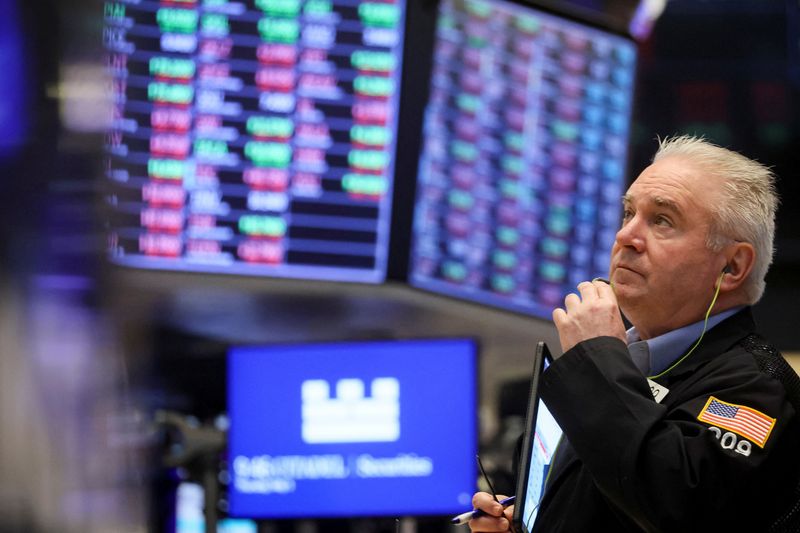By Noreen Burke
Investing.com -- In the coming week investors will be looking at a spate of U.S. data, including Wednesday’s retail sales report, for more insight into whether the Federal Reserve’s aggressive rate hikes are cooling the economy. The U.K. government is finally to announce its new budget plan and investors will be paying close attention after the market meltdown set off by September’s ‘mini-budget’. Fallout from the collapse of cryptocurrency exchange FTX will continue to reverberate through the crypto market. Meanwhile, economic data out of China will be in the spotlight after Beijing eased some of its strict pandemic restrictions on Friday, boosting hopes for an uptick in economic activity. Here’s what you need to know to start your week.
- U.S. data
Last week’s softer U.S. inflation data fueled expectations that the Fed will get less aggressive with rate hikes from December after four consecutive 75 basis point increases.
Wednesday's retail sales numbers for October should provide insight into how consumers are faring ahead of the key holiday shopping season amid historically high inflation.
Economists are expecting an increase of 0.8%. A stronger-than-expected reading could be seen as a sign the Fed still has more work to do in cooling the economy.
The U.S. is also to release October data on producer price inflation, industrial production, housing starts and existing home sales. The housing data is likely to show the ongoing impact of the rapid rise in interest rates so far this year.
- Stocks
The Nasdaq Composite index rose 8.1% last week, for its biggest weekly percentage gain since March, while the S&P 500 rose 5.9% and the Dow added 4.15% on hopes for a less hawkish Fed.
"We got a potential view that the Fed may not need to get as horrible as we thought over the last couple of weeks," Marvin Loh, senior global macro strategist at State Street in Boston, told Reuters. "Risk could be stabilizing here."
But the Fed is unlikely to be swayed by a single inflation print, and past rebounds fueled by Fed-related optimism have crumbled this year after discouraging economic data or pushback from policymakers.
Worries about an economic downturn have hammered equities this year. The S&P 500 remains down around 16% for the year to date, on track for its largest annual decline since 2008.
- Crypto turmoil
Concerns over the viability of the crypto ecosystem are continuing to swirl in the wake of the collapse of the crypto exchange FTX.
FTX, which filed for bankruptcy on Friday, was engulfed in more chaos on Saturday when the exchange said it had detected unauthorized access and analysts said hundreds of millions of dollars of assets had been moved from the platform in "suspicious circumstances".
Rival exchange Binance stopped accepting deposits of FTX's FTT token on its platform on Sunday and urged other exchanges to do the same.
Investors are now waiting to assess the extent of contagion within crypto markets, which have already taken a beating this year as central banks reverse pandemic-era monetary policy.
- U.K. budget
U.K. Chancellor Jeremy Hunt is set to announce the government's new fiscal plan on Thursday and markets will be watching closely after September's mini budget from predecessor Kwasi Kwarteng sent sterling tumbling and forced the Bank of England to intervene to stem a rout in the bond market.
The U.K. economy is facing what is likely to be a prolonged recession as a cost-of-living crisis squeezes consumers.
Hunt has indicated that around £60 billion (£1=$1.1837) in tax increases and spending cuts are coming to tackle a gaping hole in the public finances.
The U.K. is also to release the latest data on inflation, employment and retail sales in the coming days.
Inflation hit 10.1% in September and Wednesday’s data is expected to show an increase to 10.6% in October, which is likely to mark the peak given that energy prices are now being fixed by the government until April.
- China data
China is to release October data on retail sales, industrial production, investment and employment on Tuesday with economists expecting the figures to reflect the ongoing impact of the government's zero-COVID policy.
Recent data showed exports and imports unexpectedly contracting, inflation slowing, new bank lending tumbling and property sales are in an extended decline.
Beijing said Friday it was easing some of its COVID restrictions, including shortening quarantines by two days for close contacts of infected people and for inbound travelers. This comes despite cases on the mainland at 6-month highs and some big cities under fresh lockdowns.
Chinese Premier Li Keqiang vowed Saturday to continue to support the world’s second largest economy with policy measures.
--Reuters contributed to this report
